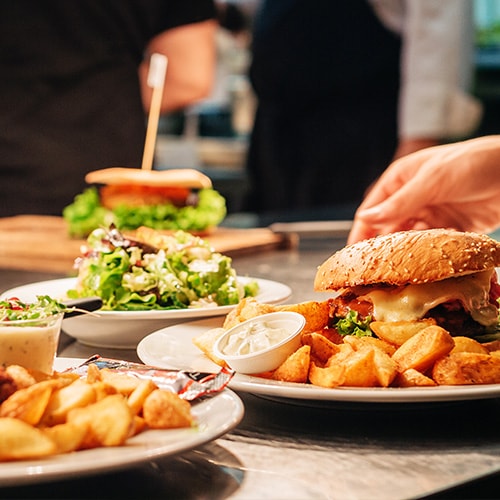Opening a restaurant is the dream of many aspiring entrepreneurs. When managed correctly, they can be profitable and fulfilling ventures, allowing you to connect with your community and enjoy financial success. Whether embracing a traditional restaurant experience or experimenting with new food trends, there are countless ways to make your dream a reality. Nevertheless, starting a restaurant requires careful planning and thoughtful execution. We've created a step-by-step guide walking you through the restaurant startup process so that you can position your new business for success.
Click any of the tips below to skip to the restaurant startup tip that interests you:
Choose a Restaurant Concept
Write a Restaurant Business Plan
Obtain Restaurant Funding
Create a Menu
Find a Commercial Space
Plan Your Restaurant's Layout
Acquire Restaurant Permits and Licenses
Acquire Restaurant Equipment
Hire Restaurant Staff
Advertise Your Restaurant
Host a Soft Opening
1. Choose a Restaurant Concept
A restaurant concept is the central idea or theme that defines your restaurant. It serves as the foundation for what your business will be and should be reflected in every aspect of your restaurant, from the decor to the menu to the overall ambiance. A clear concept allows you to develop your restaurant’s brand and identity, create a unique selling proposition, and differentiate yourself from competitors.
Your restaurant name, logo, menu design, and merchandise must reflect your concept and present a cohesive image. When customers see your logo or visit your website, they should immediately understand what your restaurant is all about. Additionally, your concept should align with the preferences and expectations of your target demographic.
Common restaurant concepts include the following:
Quick service restaurants
Casual restaurants
Fast casual restaurants
Fine dining
Contemporary restaurants
Pop-up restaurants
2. Write a Restaurant Business Plan
Restaurant business plans provide a thoroughly structured outline for how you'll start your business. They guide you through the startup process and serve as a valuable tool for presenting to investors, allowing you to flesh out the finer details of your business and prove that you have a viable concept. Restaurant business plans are divided into sections describing different aspects of your business. We've provided a breakdown of each section below:
Executive summary: Provide a general overview of your business plan. Although it is the first section that appears, it's helpful to write it last.
Company overview: Write a detailed company description and overview, highlighting specific strengths and strategies.
Concept and menu: Describe your restaurant concept in detail and provide a sample menu.
Management and ownership structure: Include details on what type of ownership structure you'll have and how you'll organize your management team.
Staffing needs: Outline staffing expectations and costs. Be realistic about your needs and provide details on any specialized positions you may need to fill.
Market and competitor analysis: Research where your restaurant will be, provide breakdowns of your target demographic, and assess competitors in your area.
Advertising and marketing strategies: Describe which restaurant advertising strategies you'll use, both short-term and long-term.
Financial projections: Provide detailed information on your current financials, how much money you'll need to start your restaurant, and how you plan to get it. Include sales forecasts and break-even analysis, as well as pricing projections.
3. Obtain Restaurant Funding
One of the biggest hurdles prospective restaurant owners face when opening a restaurant is obtaining funding. Most individuals do not have enough cash to cover the cost of opening a restaurant without financial assistance, and securing funding from outside sources will determine if you can make your business plans a reality. Estimate the total startup costs of your restaurant to determine how much you'll need, including license and permit fees, equipment costs, building renovations, and staff salaries in your projection. Before you seek funding, it's important to understand the options available to you:
Commercial loan: Traditional commercial loans are acquired directly through a bank and are typically associated with lower interest rates and access to higher amounts of capital. However, collateral is required, and you must have a high credit score to qualify.
Business line of credit: These function similarly to a credit card, allowing business owners to get approved for a maximum credit amount each month. Business lines of credit are ideal for smaller restaurant expenses, and interest only accumulates as you use the money.
Small business loan: The United States Small Business Administration (SBA) allows businesses to apply for small business loans, helping entrepreneurs finance their restaurants in the short term. You can receive a small business loan even with borderline credit, and the SBA guidelines are set up to protect both the lender and small business owners. Collateral is required, and it may take some time to get approved.
Independent investors: Independent investors or companies may want to help fund your restaurant. In many cases, these investors will provide a large sum of money in exchange for a percentage ownership stake.
Crowdfunding: Sites like Kickstarter, FoodStart, Indigogo, and GoFundMe are great platforms to raise money, allowing individuals to donate money and contribute towards your startup costs.
4. Create a Menu
A menu is the highlight of a restaurant and the main factor influencing a customer's dining experience. Therefore, it is crucial to carefully curate a menu that matches your restaurant concept and reflects the experience you want to give your guests. Creating a menu goes beyond just listing the dishes you plan to serve. Your menu also dictates what kind of equipment you'll need, what kinds of skills to look for in staff, and the type of customers you'll attract. As you craft your menu, there are several factors to take into account:
Menu layout: Organize your menu in a logical and easy-to-read format, considering factors like flow and visual hierarchy. Group similar items together, use clear headings and subheadings, and employ legible font styles and sizes.
Menu pricing: Conduct a thorough analysis of your costs, including ingredient expenses, labor costs, and overheads, to arrive at a suitable pricing structure.
Profit margins: By carefully monitoring costs and pricing, you can ensure that your menu items generate sufficient profit to cover expenses and promote business growth. Analyze your profit margin by calculating its food cost percentage and comparing it to industry benchmarks.
Food storage: Consider the storage requirements of each item and the availability of necessary storage space to optimize kitchen workflow and minimize waste. Certain menu items may require specific temperature-controlled storage, while others may need to be stored separately to prevent cross-contamination.
Sales projections: Understanding the demand for different items and predicting customer preferences can help maximize inventory management. Analyze historical sales data, conduct market research, and consider factors like seasonality, local trends, and customer feedback to develop a menu that aligns with projected sales.
5. Find a Commercial Space
Whether building a new facility or leasing an existing one, the type of space you operate out of and its location will play a significant role in your success. Conducting a thorough location analysis will help you identify locations and markets that fit your restaurant's needs. Consider these variables as you choose a commercial space:
Restaurant visibility and accessibility: You want your restaurant to be easily visible to potential customers and accessible to both foot and vehicle traffic. Additionally, consider the ease of parking for your customers, as this can impact convenience.
Customer demographics: Take time to research the demographics of the area you're considering. Understanding the age, income level, and preferences of potential customers will help determine if your restaurant's concept aligns with the target market.
Restaurant labor costs: Different areas have different wage rates and labor laws, which can affect labor costs.
Competitors: Look into restaurants in the area and evaluate their concept, menu, pricing, and popularity. Consider if there is a gap in the market or if the area is saturated with similar concepts. While competition can be healthy, too much can make it difficult for your restaurant to thrive.
Local regulations: Each city or county has laws that dictate what types of businesses can operate in certain areas. Familiarize yourself with these regulations to ensure that your restaurant is compliant and safe from the threat of future legal issues.
6. Plan Your Restaurant's Layout
From the moment they walk through the door to the time they leave, your establishment's layout can have a profound impact on a customer's dining experience. A well-designed layout can enhance the flow of service, create a comfortable and inviting atmosphere, and even influence customer perception of food quality. When planning a restaurant layout, there are two primary areas to focus on: front-of-house and back-of-house.
Front-Of-House Layout
The front-of-house refers to the areas of the restaurant that are visible and accessible to customers, including the dining area, bar, lobby, and restrooms. A well-designed front-of-house layout creates a welcoming and efficient space that allows for smooth traffic flow, maximizes seating capacity, and provides a comfortable environment for your guests. To achieve this layout, keep the following factors in mind:
Seating capacity: Ensure that your restaurant can accommodate the number of guests you expect to serve at any time based on the size of your dining area and the service you provide. Some restaurants prioritize maximizing the number of seats to increase revenue, while others focus on spacious seating arrangements for a more relaxed dining experience.
Furniture: The furniture you select should be comfortable for your guests and fit the overall theme of your restaurant. Consider style, material, and durability to ensure it can withstand the demands of daily use in a commercial setting.
Ambiance and decor: The ambiance and decor of your front-of-house area play a vital role in creating a pleasant and inviting atmosphere for your guests. Incorporating unique lighting, color schemes, artwork, and music can enhance the dining experience and create a cohesive atmosphere. Pay attention to details such as table settings, wall decorations, and even plants or greenery to add a touch of freshness and visual interest.
Cleanability: In a restaurant setting, spills and messes are inevitable. Therefore, it's essential to choose materials and finishes that are easy to clean and maintain. Opt for furniture and flooring that are stain-resistant and durable, such as laminate or vinyl.
Maneuverability: Your staff needs to move efficiently while serving guests and attending to their needs, and your layout should provide clear pathways for servers to navigate between tables and the kitchen area. Additionally, consider the placement of service stations, such as beverage or dessert stations, to minimize congestion.
Back-Of-House Layout
Back-of-house refers to areas not seen by customers, including the kitchen, storage areas, and employee workspaces. Your back-of-house layout is critical for ensuring smooth and efficient operation. Consider the different back-of-house tasks as you design your layout
Warewashing: Allocate sufficient space for a warewashing area. This area should include a dishwashing machine, a sink for manual washing, ample space for dish racks, and shelving for clean dishes. Additionally, consider the flow of dirty and clean dishes to prevent cross-contamination.
Dry and cold storage: Dry storage spaces should be clean, organized, and easily accessible for inventory management and stock rotation. Cold storage spaces, such as walk-in refrigerators and freezers, should be strategically placed to minimize the distance food needs to travel from storage to preparation areas.
Food preparation: Designing an efficient food preparation area involves considering the flow of ingredients, equipment, and personnel. This area should include sufficient counter space, cutting boards, sinks, and storage for utensils and equipment. Placing preparation areas close to refrigeration and dry storage areas can help streamline workflow and reduce unnecessary movement.
Cooking: This area should accommodate your restaurant's specific cooking equipment needs, such as ranges, ovens, grills, and fryers. Consider ventilation and fire safety requirements when planning the layout of the cooking area, as proper ventilation systems should be in place to remove heat, smoke, and cooking odors from the kitchen.
Service: This area should facilitate quick and efficient plating, ensuring proper organization of prepared dishes. It should be equipped with counters, warming equipment, and storage for plates, utensils, and garnishes.
7. Acquire Restaurant Permits and Licenses
Restaurant licenses and permits are required at the federal, state, and local levels, and it is crucial to consult with local authorities and legal counsel to ensure you have all the necessary permits. Though the specific permits and licenses you need can vary depending on where you operate, we've listed some of the most common below:
Business license: A business license is obtained from the local government and states that you are legally allowed to operate a business. The application process involves providing basic information about your business, such as its name, location, and ownership details.
Employer identification number: An employer identification number (EIN) is necessary to hire employees. This number is used for tax purposes and obtained from the IRS, and you can apply for one through the IRS website.
Foodservice license: This license ensures that your establishment meets the health and safety regulations set by local authorities. The application process often involves submitting documentation such as a menu, floor plan, and proof of food handlers' certifications.
Liquor license: If you plan to serve alcoholic beverages in your restaurant, you must obtain a liquor license. The application process varies by state but typically requires information on what alcohol you plan to serve, your restaurant's location, and any relevant background checks.
Health permit: A health permit is necessary to demonstrate that your restaurant meets health and safety standards set by local health departments. It is obtained after a health inspection, which evaluates various aspects of your establishment, such as food handling practices, cleanliness, and equipment maintenance.
8. Acquire Restaurant Equipment
Investing in the right equipment ensures that your kitchen operates efficiently and effectively. Though you may need to buy specialized equipment, there are certain types of equipment that every restaurant needs, such as refrigerators, ranges, ovens, fryers, grills, and worktables. When it comes to outfitting a kitchen, there are three options available for new restaurant owners:
Purchase new equipment: New equipment provides the advantage of starting from scratch. Brand-new equipment is reliable and typically comes with warranties, ensuring that any unexpected issues or malfunctions are covered. However, new equipment can be costly, especially for startup ventures with tight budgets.
Purchase used equipment: Used equipment can be budget-friendly while providing the necessary functionality for your kitchen. Many kitchen appliances can be found at significantly lower prices, making it an attractive option for entrepreneurs looking to save on initial costs.
Lease equipment: By leasing equipment, you can avoid the hefty upfront costs of purchasing new equipment. While leasing, you'll pay a monthly fee over a set lease agreement, with the option to extend your agreement at the end. Leasing gives you the option to upgrade your equipment as technology advances or when your business needs change.
9. Hire Restaurant Staff
When opening a new restaurant, one of the most crucial aspects is building a strong team of employees. It is an opportunity to establish a positive work culture, ensuring smooth operation and excellent customer service. Put thought into your employee benefits, training, and incentives to create a positive working environment and maintain a work-life balance. You can start off on the right foot by integrating a digital team management platform like Connecteam. This mobile app helps you streamline all the process involved in hiring, training, and managing your teams.
While filling out your staff, there are several key positions to focus on. These are a few of the roles you'll need to hire:
Management team: General manager, kitchen manager, front-of-house manager
Kitchen staff: Head chef, sous chefs, prep cooks, line cooks, dishwashers
Front-of-house staff: Servers, hosts, food runners, bussers
Bar staff: Bartenders, barbacks, cocktail servers
10. Advertise Your Restaurant
One of the keys to opening a successful restaurant is getting the word out. Successful advertising should also build excitement about your brand, enticing customers to visit. We've listed common ways that new restaurants advertise their brand below:
Build a website: Your restaurant website should be easy to navigate, and the design should represent your brand. Include basic information, including your address, phone number, hours, and menu. Though you can hire a professional to create your website, you can make one with user-friendly hosting platforms like Wix, Squarespace, or WordPress.
List your restaurant online: Registering with Yelp, Tripadvisor, and Google My Business makes it easy for potential guests to find your restaurant information. Guests can also leave reviews after visiting, which increases your authority and appeal.
Embrace social media: Maintaining a social media presence is essential for modern restaurants. Create Facebook, Twitter, and Instagram accounts to share news, photos, and tidbits about your restaurant. TikTok has also gained popularity in recent years, proving to be an effective way of engaging with customers.
Offer promotions to new guests: Offer a promotion for first-time guests. A free beverage, dessert, or discount on their first bill is an enticing way to attract customers.
Host a grand opening: Create buzz around your new restaurant by hosting a grand opening. Special events like wine tastings, live music, or cooking classes are also a great way to attract attention.
11. Host a Soft Opening
A soft opening is a practice run to help you prepare for the grand opening of your new restaurant. Invite a limited number of guests to attend, such as friends, family, or acquaintances of your staff. As you plan the event, consider the different types of soft opening strategies:
Trial menu: Offer a sample menu with a limited number of options. It reduces stress on new staff and encourages customers to return for the full menu.
Limited schedule: Consider operating under a limited schedule for the first few days you are open.
Sneak peek event: Host a "sneak peek" happy hour with select menu items and signature drinks.
Friends and family night: Invite friends and family to your soft opening for a fun, stress-free way to prepare for your grand opening.
Neighboring homes and businesses night: Gain local fans and build community pride by offering a soft opening invite to neighboring homes and businesses.
Back to Top
Starting a restaurant can be a stressful and confusing process. As foodservice trends continue to diversify, space opens up for extraordinary new eateries to step in and take advantage of new consumer interests. Using the steps outlined above, you can lay a solid foundation and position your restaurant startup for success.







